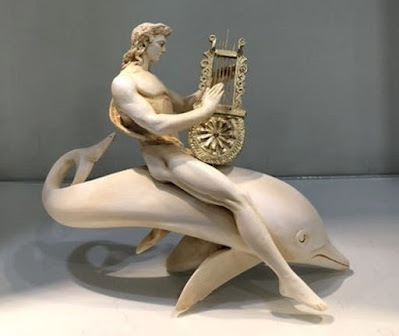Arīōn autem ā delphīne exceptus dorsō Taenarum dēlātus est. Ēgressus in terram, Corinthum cum eōdem habitū contendit. Ibi nautārum facta nārrāvit. Periander autem eī crēdere nōluit. Arīōn igitur in cūstōdiā ab eō retentus est.
vocabulary
contendō, -ere, contendī, contentus [3]: hurry; journey quickly (to a place)
excipiō, -ere, excēpī, exceptus [3-iō]: (here) receive; ā delphīne exceptus dorsō │ having been received by a dolphin on its back = having been taken onto the back of a dolphin
habitus, -ūs [4/m]: dress; attire
retineō, -ēre, retinuī, retentus [2]: detain; restrain; confine
Taenarus, -ī [2/m]: Taenarus, a promontary and town in Laconia, a region in the southern Peloponnese, Greece
https://en.wikipedia.org/wiki/Taenarus_(mythology)
questions
- How was Arion helped? (3)
- What did Arion do when he reached land? (1)
- How was he dressed? (1); note: cum eōdem habitū
- What did Arion recount and how did Periander react? (3)
notes
[1] dē¦ferō, dēferre, dētūlī, dēlātus [3]: carry away
Taenarum dēlātus est │ he was carried away to Taenarus
[2] deponent verbs
ēgredior, ēgredī, ēgressus sum [3-iō/dep]: go out; come out; disembark
An important point always to bear in mind when dealing with the deponent verbs; they look passive in form but they are active in meaning and that also applies to this participle:
Compare:
[i] Passive verbs
Nautae vērō precibus virī nōn commōtī, … │ But the sailors, not moved [passive] by the man’s entreaties …
Nautae suāvī carmine captī … │ The sailors, captivated [passive] by the sweet song …
… omnī ōrnātū suō indūtus … │ … dressed [passive] in all his fine clothing …
Arīōn autem ā delphīne exceptus dorsō │ Arion, however, having been received [passive] by a dolphin onto its back = having been taken onto the back of a dolphin i.e. he was given a ride on the back of a dolphin
Arīōn autem … Taenarum dēlātus est. │ Arion, however, … was carried away [passive] to Taenarus
Arīōn igitur in cūstōdiā ab eō retentus est. │ Arion, therefore, was held [passive] in custody by him
However …
[ii] deponent verbs
Ēgressus in terram … │ Having disembarked [active] (onto the land) …
Is diū … versātus erat │ He had lived [active] for a long time …
…Tarentō … profectus est; │He set out [active] from Tarentum
vītam dēprecātus est │ he begged for [active] (his) life
mortem eī statim minātī sunt │ they immediately threatened [active] him with death

